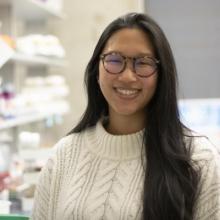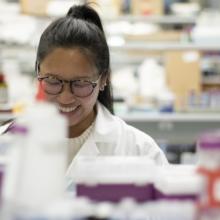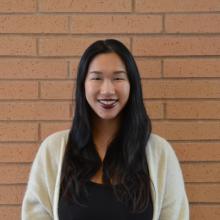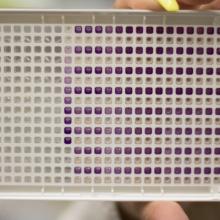Lianna Wat
Why did you decide to pursue a graduate degree?
Pursuing a scientific career in basic research was a passion that I developed during my fourth year of undergraduate studies, when I complete an honours thesis project. This project was a pivotal experience in my career because this was when I discovered my passion for research and realized how much I enjoyed designing elegant experiments to understand interesting phenomena. Altogether, I want to pursue a career in scientific research as an independent researcher – so I started by aiming for a PhD in science.
Why did you decide to study at UBC?
I ultimately decided to study at UBC because I enjoyed the environment and mindset of the people. From speaking to the individuals in the lab, I felt that UBC is an open, accepting, and collaborative environment where advice and help is freely given. Additionally, UBC is a melting pot of people and I was really excited for the chance to learn from the vast number of brilliant professors that hail from across the globe.
What is it specifically, that your program offers, that attracted you?
I was attracted to the diversity of research that fell within Cell & Developmental Biology (CELL) program. Not only does this give me the opportunity to learn from experts in many fields, it also challenges me to see the connections between all the research projects. Additionally, the diversity in the program fosters collaborations between trainees because there will surely be someone that can help you solve your challenges.
What was the best surprise about UBC or life in Vancouver?
What surprised me most about Vancouver what how accessible the outdoors is. Part of the reason I was excited to come to UBC was to be able to experience the mountains – but I had close to zero experience hiking. When I started looking into hikes, I realized that there are so many resources for beginners. I have also thoroughly enjoyed all the artisanal ice-cream shops in the city…
What aspect of your graduate program do you enjoy the most or are looking forward to with the greatest curiosity?
I enjoy the student-led CELLS seminar the most. This is a student-led initiative where once a month, a group of trainees will present their most recent research. This event gives everyone the opportunity to see the variety of research in the CELL program and also allows you to meet your peers in a stress-free and social setting.
What do you see as your biggest challenge(s) in your future career?
My biggest challenge will likely be to empower female scientists. Traditionally, women interested in STEM careers face visible and invisible obstacles that prevent them from pursuing their goals. As such, I want to be a role model and advocate for females in my field that can mitigate challenges that we may face.
How do you feel your program is preparing you for those challenges?
I have been very fortunate to be surrounded by mentors and colleagues in the CELL program that also fully support females in STEM careers. Specifically, I have powerful female role models that have overcome the challenges to opening their own labs and they also push me to achieve my career goal of becoming an independent researcher.
What aspects of your life or career before now have best prepared you for your UBC graduate program?
The most valuable skill I brought with me to the CELL graduate program is time-management. Ever since I was a child, I have balanced various extracurricular activities (such as music, sports teams, and community leadership) with schoolwork. As such, I learned how to allocate my time and use my time effectively and efficiently. This has been an invaluable skill as a graduate student because lab work can quickly takeover your life if you don’t actively maintain a healthy work-life balance.
What do you like to do for fun or relaxation?
I like to start my mornings early with some sweaty, hot yoga. It’s my personal quiet time where I can focus on myself and recalibrate for the day. But since I’ve moved to Vancouver, I have taken up the habit of hiking every weekend in the summer and rekindled my love for skiing.
What advice do you have for new graduate students?
My main piece of advice for new graduate students is: to be kind to yourself. When you first begin, you look at the senior students around you and think about how much knowledge and know-how they have. Then when you are asked a question you don’t know the answer to or you just did an assay that didn’t work, you feel like you don’t belong and that you aren’t smart enough. But you need to remember that those senior students started where you did and it took time and practice to improve. So be kind and patient with yourself as you learn.




